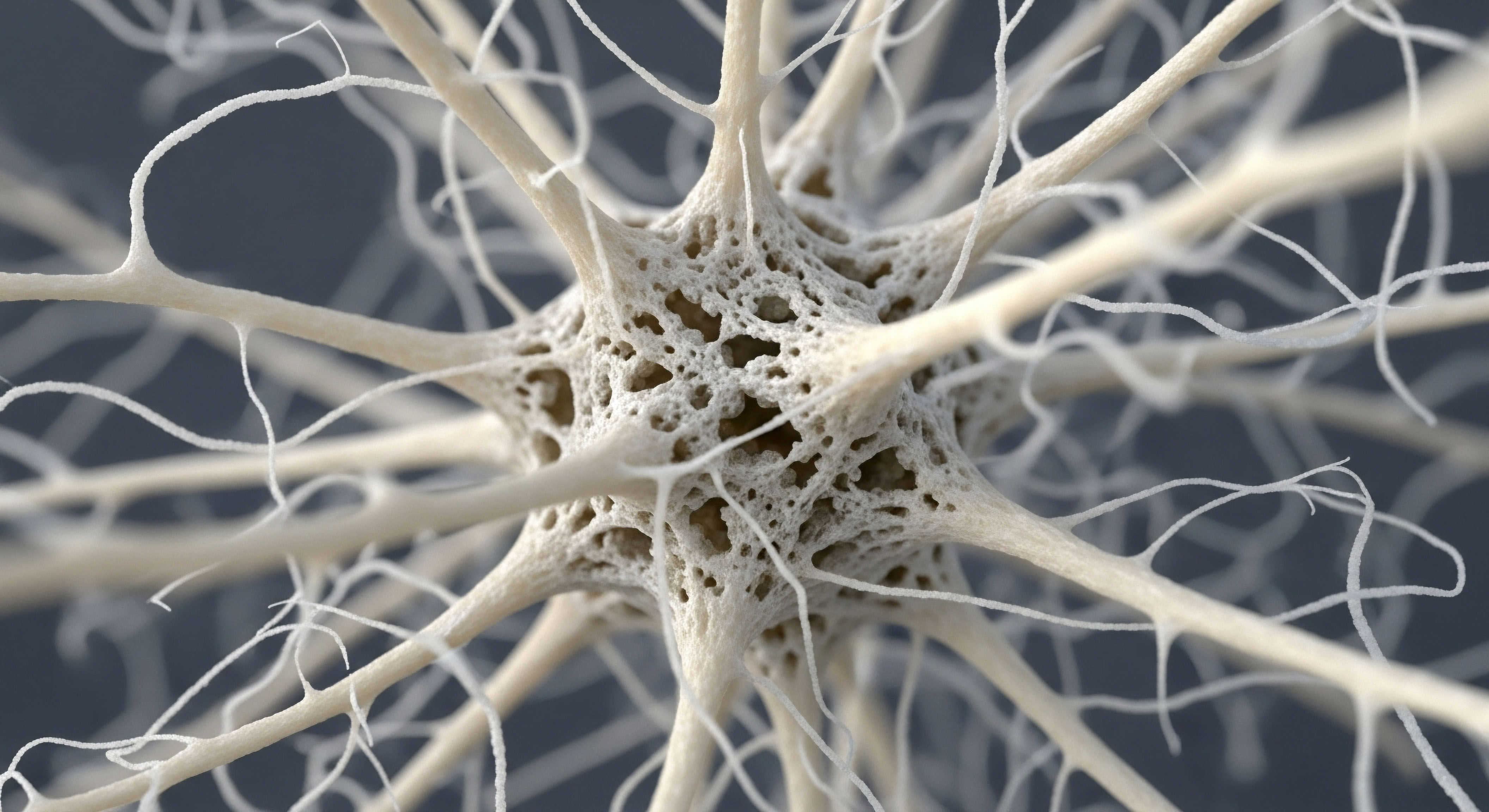

Reclaiming Your Vitality the Lifestyle Connection
Many individuals experience a subtle, yet persistent, sense of imbalance within their own bodies. This often manifests as diminished energy, disrupted sleep patterns, or a lingering feeling of not quite functioning at peak capacity. Such sensations frequently signal a disharmony in the intricate symphony of hormonal health and metabolic function. You are not alone in seeking to understand these shifts and to restore a state of vibrant well-being.
Understanding your biological systems provides a profound path to reclaiming vitality and function without compromise. Peptide protocols offer sophisticated tools for biochemical recalibration, acting as targeted messengers within the body’s communication networks. These short chains of amino acids direct specific cellular responses, influencing everything from tissue repair to endocrine signaling. The true power of these protocols unfolds when the body’s foundational environment supports their actions.
Optimizing diet and sleep establishes a prime physiological landscape, allowing peptide protocols to achieve their intended biological effects.
Consider the body’s internal milieu as a garden. Peptides represent specialized seeds, designed to grow specific, beneficial plants. The soil quality, sunlight, and water supply ∞ these elements mirror your lifestyle choices. A nutrient-dense diet provides fertile ground, delivering the necessary building blocks and cofactors for cellular processes. Restorative sleep, akin to consistent, gentle rain, orchestrates the natural rhythms of repair and regeneration. These fundamental inputs significantly modulate the body’s receptivity and response to targeted peptide interventions.

Understanding Biological Communication
The endocrine system operates as a complex network of chemical messengers, with hormones and peptides orchestrating countless physiological activities. These messengers bind to specific receptors on target cells, initiating cascades of events that regulate metabolism, growth, mood, and reproductive functions. The effectiveness of any exogenous peptide, such as those utilized in therapeutic protocols, hinges on the optimal functioning of these intrinsic communication pathways.
Dietary choices directly influence the availability of substrates for hormone synthesis and the sensitivity of cellular receptors. Similarly, sleep architecture profoundly impacts the pulsatile release of numerous endogenous hormones, including growth hormone, which directly relates to the efficacy of growth hormone-releasing peptides. When these lifestyle pillars are robust, the body’s natural systems are better poised to interpret and amplify the signals delivered by therapeutic peptides, leading to more pronounced and sustained benefits.


How Do Lifestyle Factors Impact Peptide Protocols?
Peptide protocols, ranging from testosterone replacement therapy to growth hormone secretagogues, rely on the body’s intrinsic capacity to respond to and process these biochemical signals. Diet and sleep are not merely supplementary elements; they serve as fundamental determinants of the endocrine system’s responsiveness and overall metabolic health. An individual’s nutritional status and sleep patterns directly influence the bioavailability, receptor affinity, and downstream signaling of administered peptides.

Dietary Modulators of Peptide Efficacy
The food we consume provides the molecular scaffolding for all bodily functions. A diet rich in whole, unprocessed foods, balanced macronutrients, and diverse micronutrients creates an environment conducive to robust hormonal signaling. Conversely, diets high in refined sugars and inflammatory fats can disrupt metabolic pathways, leading to insulin resistance and systemic inflammation, conditions that can attenuate the effectiveness of peptide interventions.
Specific dietary components play distinct roles in modulating peptide action.
- Protein Intake ∞ Adequate protein provides essential amino acids, which are the fundamental building blocks for both endogenous peptides and the synthesis of new proteins, including hormone receptors. Protein also influences the secretion of gastrointestinal peptides like glucagon-like peptide-1 (GLP-1) and peptide YY (PYY), which are involved in satiety and metabolic regulation.
- Healthy Fats ∞ Essential fatty acids are crucial for cell membrane integrity and fluidity, directly impacting receptor function and cellular signaling. These fats also serve as precursors for steroid hormones, which are often part of broader hormonal optimization protocols.
- Micronutrients ∞ Vitamins and minerals act as cofactors for numerous enzymatic reactions involved in hormone synthesis, metabolism, and receptor activation. Zinc, magnesium, and B vitamins, for instance, play roles in testosterone production and cellular energy pathways.
A balanced, nutrient-dense diet provides the necessary substrates and cofactors, ensuring optimal cellular machinery for peptide responsiveness.
Consider the example of Growth Hormone Peptide Therapy, involving agents like Sermorelin or Ipamorelin. These peptides stimulate the pituitary gland to release its own growth hormone. The efficacy of this stimulation relies heavily on the overall metabolic health of the individual.
Insulin sensitivity, directly influenced by diet, dictates how effectively the body can utilize growth hormone and its downstream mediator, insulin-like growth factor 1 (IGF-1). Poor dietary habits can lead to impaired glucose metabolism, creating a less responsive environment for these growth-promoting signals.

Sleep Architecture and Endocrine Synchronization
Sleep represents a critical period of physiological restoration and hormonal orchestration. The body’s major endocrine axes, including the hypothalamic-pituitary-gonadal (HPG) axis and the growth hormone axis, exhibit distinct pulsatile release patterns synchronized with sleep stages. Disruptions to this delicate rhythm can significantly impede the body’s capacity to benefit from peptide protocols.
Slow-wave sleep (SWS), often referred to as deep sleep, is particularly important for the robust pulsatile release of growth hormone. Individuals experiencing fragmented sleep or insufficient SWS may exhibit reduced endogenous growth hormone secretion, thereby limiting the potential gains from growth hormone-releasing peptides. Sleep deprivation also elevates cortisol levels, which can antagonize the actions of other hormones and peptides, creating a catabolic state.
The interplay between sleep and hormonal balance extends to testosterone production. Testosterone exhibits a diurnal rhythm, with peak levels often observed in the morning, closely tied to restorative sleep cycles. Chronic sleep restriction can lead to a measurable reduction in circulating testosterone, impacting the foundational state for men undergoing testosterone replacement therapy.
| Lifestyle Factor | Optimal State Influence | Suboptimal State Influence |
|---|---|---|
| Diet (Nutrient-Dense) | Enhances receptor sensitivity, provides metabolic cofactors, supports hormone synthesis. | Induces insulin resistance, promotes inflammation, depletes nutrient reserves. |
| Sleep (Restorative) | Synchronizes pulsatile hormone release, optimizes growth hormone secretion, reduces catabolic stress. | Disrupts circadian rhythms, blunts growth hormone pulses, elevates cortisol. |


Circadian Rhythm and Peptide Signaling ∞ A Deeper Dive
The intricate relationship between lifestyle factors and peptide efficacy extends to the molecular underpinnings of cellular signaling and gene expression, profoundly influenced by the body’s master clock, the circadian rhythm. This internal timing system, governed by the suprachiasmatic nucleus in the hypothalamus, orchestrates a vast array of physiological processes, including hormonal secretion patterns, metabolic enzyme activity, and cellular repair mechanisms. Optimizing these rhythms through consistent diet and sleep practices creates a highly receptive environment for peptide interventions.

Molecular Synchronicity and Growth Hormone Axis
The pulsatile secretion of growth hormone (GH) stands as a prime example of circadian and sleep-dependent hormonal regulation. A significant proportion of daily GH output, particularly in men, occurs during the initial episodes of slow-wave sleep (SWS).
This surge is primarily mediated by the hypothalamic release of growth hormone-releasing hormone (GHRH) and a concomitant reduction in somatostatin, a GH-inhibiting hormone. Peptide protocols utilizing GHRH analogs like Sermorelin or GH secretagogues such as Ipamorelin capitalize on this natural physiological pathway.
When sleep architecture is fragmented or the circadian rhythm is desynchronized, the natural pulsatility of GH release diminishes. This directly impacts the pituitary gland’s responsiveness to exogenous GHRH or ghrelin mimetics. Chronic sleep restriction can lead to a blunted GH response, potentially requiring higher doses of peptides or yielding less robust clinical outcomes. The efficacy of these peptides, therefore, correlates directly with the underlying integrity of the sleep-wake cycle and its influence on neuroendocrine signaling.
Circadian alignment of sleep and dietary intake optimizes cellular responsiveness, enhancing the physiological impact of therapeutic peptides.

Nutritional Epigenetics and Receptor Dynamics
Dietary components exert their influence beyond providing simple energy or building blocks; they act as powerful epigenetic modulators, influencing gene expression and receptor dynamics. Specific macronutrients and micronutrients can alter the sensitivity of target cells to peptide hormones by affecting receptor density, affinity, and post-receptor signaling cascades.
For instance, a diet high in refined carbohydrates and saturated fats can promote systemic inflammation and insulin resistance. Insulin resistance, a state where cells become less responsive to insulin’s signals, frequently coexists with reduced sensitivity to other peptide hormones. This occurs through complex crosstalk between insulin signaling pathways and those activated by other growth factors and peptides. Chronic hyperinsulinemia can lead to downregulation of various receptor types, creating a less permissive environment for peptide action.
Conversely, diets rich in antioxidants and anti-inflammatory compounds, such as polyphenols found in fruits and vegetables, can preserve cellular integrity and enhance receptor function. Omega-3 fatty acids, for example, are incorporated into cell membranes, influencing their fluidity and the efficiency of signal transduction across the cell surface. These nutritional inputs provide a biochemical foundation that amplifies the intended effects of therapeutic peptides.
| Macronutrient | Primary Hormonal Impact | Relevance to Peptide Efficacy |
|---|---|---|
| High-Quality Protein | Stimulates GLP-1, PYY, supports amino acid pool for peptide synthesis. | Directly supports the production of endogenous peptides and receptor proteins, optimizes satiety signals. |
| Complex Carbohydrates | Modulates insulin sensitivity, provides stable glucose for energy. | Maintains metabolic balance, prevents insulin resistance that can dampen peptide effects. |
| Healthy Fats | Supports cell membrane structure, precursor for steroid hormones. | Ensures optimal receptor function, provides foundational support for broader endocrine health. |

The Gut-Brain-Endocrine Axis and Peptide Bioavailability
The gut microbiome plays a sophisticated, yet often overlooked, role in modulating peptide efficacy. The trillions of microorganisms residing in the gastrointestinal tract influence nutrient absorption, synthesize short-chain fatty acids, and interact with the enteric nervous system, forming a critical component of the gut-brain-endocrine axis. This axis directly impacts the bioavailability and systemic effects of both orally administered and endogenously produced peptides.
A diverse and healthy microbiome contributes to the integrity of the intestinal barrier, preventing systemic inflammation that can impair hormonal signaling. Certain microbial metabolites can also influence the activity of enzymes that degrade peptides, thereby affecting their half-life and therapeutic window. For instance, a compromised gut barrier, often associated with suboptimal dietary patterns, can lead to increased inflammatory cytokines, which antagonize growth hormone action and impair cellular repair processes that peptides aim to facilitate.
Optimizing gut health through a fiber-rich diet, fermented foods, and targeted probiotics can therefore enhance the systemic environment, allowing peptides to exert their full therapeutic potential. This holistic perspective acknowledges the profound interconnectedness of physiological systems, where seemingly disparate lifestyle choices converge to influence the most refined biochemical interventions.

References
- Melmed, Shlomo, et al. Williams Text of Endocrinology. 14th ed. Elsevier, 2020.
- Lavin, Norman. Manual of Endocrinology and Metabolism. 5th ed. Wolters Kluwer, 2017.
- Greenspan, Francis S. and David G. Gardner. Greenspan’s Basic and Clinical Endocrinology. 10th ed. McGraw-Hill Education, 2017.
- Wass, John A. H. and Paul M. Stewart. Oxford Textbook of Endocrinology and Diabetes. 3rd ed. Oxford University Press, 2019.
- Van Cauter, Eve, et al. “Physiology of growth hormone secretion during sleep.” Journal of Clinical Sleep Medicine, vol. 20, no. 1, 1998, pp. 20-24.
- Brandt, Michael, and Peter O. J. Van Cauter. “Pulsatile secretion of growth hormone during sleep.” The Lancet, vol. 355, no. 9205, 2000, pp. 697-700.
- Drucker, Daniel J. “The role of peptide hormones in the adaptation to altered dietary protein intake.” International Journal of Molecular Sciences, vol. 22, no. 16, 2021, pp. 8839.
- Zhang, Jing, et al. “The Role of Peptides in Nutrition ∞ Insights into Metabolic, Musculoskeletal, and Behavioral Health ∞ A Systematic Review.” International Journal of Molecular Sciences, vol. 25, no. 12, 2024, pp. 6758.
- Raybould, Helen E. “How and why do gastrointestinal peptides influence food intake?” Physiology & Behavior, vol. 183, 2018, pp. 30-36.
- Sapolsky, Robert M. Why Zebras Don’t Get Ulcers. 3rd ed. Henry Holt and Company, 2004.

Your Path to Optimized Well-Being
This exploration into lifestyle factors and peptide protocols offers a glimpse into the profound capacity of your body for self-regulation and restoration. The knowledge gained here marks a significant step, illuminating the scientific underpinnings of vitality. Your personal health journey represents a unique biological narrative, one where understanding your own systems becomes the compass for informed decisions. This journey towards optimized well-being, while guided by evidence, ultimately unfolds through personalized attention and consistent, mindful action.



